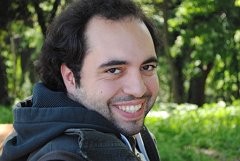The Rational Programmer, An Investigative Method for Programming Language Pragmatics
The productivity of developers depends on the quality of the available programming languages: their support for adequate testing, for locating and fixing mistakes, and for maintenance tasks. If a programming language does not support these routine tasks, the developer is forced to resort to labor-intensive and ineffective workarounds. Put differently, it isn’t about the syntax, the types, or the semantics, but about the pragmatics of a programming language. The problem is that the PL research area has so far few tools to evaluate pragmatics.
The Rational Programmer is a new scientific instrument for that purpose. While simulations have a long history in computer science applications, the Rational Programmer method puts them to new use in PL research. The heart of the method is a simulation, namely an algorithmic abstraction of information gathering in a work context. The outcome of a rational programmer simulation is typically a strategy that a developer can employ. It may also point designers and researchers to a problematic aspect of a language. Finally, it can inform instructors how to teach students the effective use of a language. In this talk, I will demonstrate the workings of the Rational Programmer method with examples.
Sat 9 SepDisplayed time zone: Pacific Time (US & Canada) change
11:00 - 12:30 | SCHEME: Session IIScheme at Olympic Chair(s): Marco T Morazan Seton Hall University 11:00 The Calysto Scheme Project, James B. Marshall and Douglas Blank 11:30 Keynote Address: The Rational Programmer, Christos Dimoulas | ||
11:00 30mTalk | The Calysto Scheme Project Scheme Pre-print | ||
11:30 60mKeynote | The Rational Programmer, An Investigative Method for Programming Language Pragmatics Scheme Christos Dimoulas PLT @ Northwestern University | ||
Schedule: 11:30-12:30
